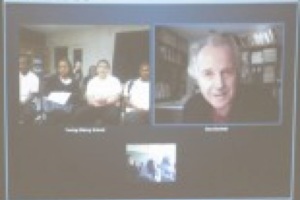The News Literacy Project hosts groundbreaking video conference

The event, which was supported by Skype, brought middle school students in Chicago and high school students in New York together online to connect with NLP fellow Don Bartletti, a Pulitzer Prize-winning photojournalist with the Los Angeles Times, who presented a lesson from his home in San Diego.
The occasion marked an important milestone in the News Literacy Project’s efforts to develop its use of digital resources as it seeks to expand its model to get to scale.
The event spanned four time zones and both coasts as students at the Facing History School on the West Side of Manhattan and students from Perspectives Middle Academy and the Reavis School on Chicago’s South Side talked with Bartletti in San Diego.
Skype donated webcams, premium vouchers and an ethernet cable to make the event possible and dispatched a video crew to document the landmark occasion in New York.
After participants in each city greeted everyone, Bartletti introduced the students to his work on a series of reports about young migrants traveling from Central America to the Texas border. The series, written by Sonia Nazario and later published as a book titled Enrique’s Journey, required Bartletti to ride on the tops of freight trains with the youths to document their dangerous passage. The core of his lesson dealt with the ethics of photojournalism and the lengths to which photographers and reporters go to accurately capture individual stories and events for their readers and viewers.
“I use my camera as a witness — to show you what the world looks like,” Bartletti told the students in New York and Chicago. “A photograph can sometimes be a story in itself.”
He also emphasized that journalists do not alter or influence their photos in any way.”This is the ethics of photojournalism that I want to impress on you: We, as journalists, want to watch the world happen—we don’t want to make it happen,” Bartletti said. “My photos are true.”
In Chicago, the call was part of a second annual news literacy conference involving two schools participating in the Elev8 Program: the Reavis School and Perspectives Middle Academy. Students and teachers from the schools reflected on their experiences with the NLP unit this spring and shared some of their final news literacy projects.
Perspectives students, who completed the NLP unit as part of their social studies classes in select sixth-, seventh- and eighth-grade sections, shared a news literacy rap, an editorial cartoon and a letter to a local newspaper reporter and the reporter’s response. The Reavis students — also a mix of sixth-, seventh- and eighth-graders — shared a broadcast report on the effect of video games on youth that they produced collaboratively as part of an NLP-supported after-school program.
In New York, about 20 ninth-, 10th- and 12th-grade students gathered at Facing History School for the Skype event. The ninth- and 10th-grade students prepared for the call with a one-day lesson on immigration and also read the award-winning series in the Los Angeles Times. As part of their curriculum, the students read excerpts from Enrique’s Journey during a unit on immigration. The Skype event was a rare opportunity for the students to hear directly from the journalist whose work they had studied.
“It was a wonderful experience for me and my students,” said Facing History teacher Carolyn Casale.